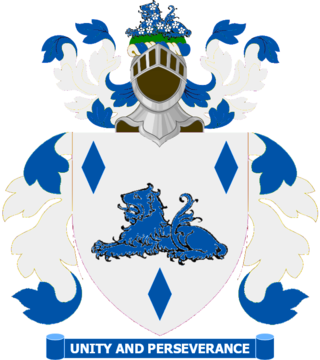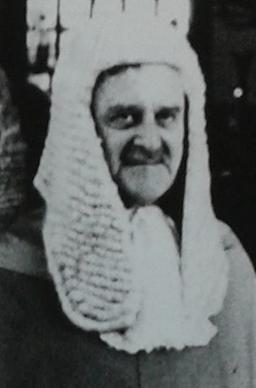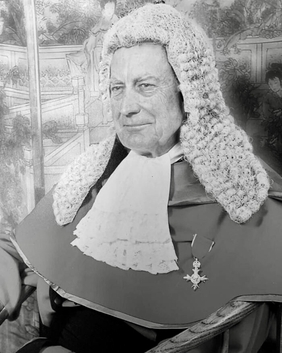
A judge is a person who presides over court proceedings, either alone or as a part of a panel of judges. In an adversarial system the judge hears all the witnesses and any other evidence presented by the barristers or solicitors of the case, assesses the credibility and arguments of the parties, and then issues a ruling in the case based on their interpretation of the law and their own personal judgment. A judge is expected to conduct the trial impartially and, typically, in an open court.
Sir Ti-liang Yang, was a Hong Kong judge. He was the Chief Justice of Hong Kong from 1988 to 1996, the only ethnic Chinese person to hold this office during British colonial rule.
Sir Noel Plunkett Power, was a senior judge in Hong Kong and Brunei Darussalam. He had been a barrister-at-law in his home-country Australia when he joined the judiciary of Hong Kong in 1965 as a magistrate in the Lands Tribunal. Since then, he had been successively promoted as President of the Lands Tribunal, a puisne judge of the Supreme Court and Vice-President of the Court of Appeal. In 1996, he became acting Chief Justice of the Supreme Court when Sir Ti-liang Yang resigned and contested for the first ever election of the Chief Executive. After the transfer of sovereignty over Hong Kong from Britain to People's Republic of China in 1997, he was appointed Vice-President of the Court of Appeal of the High Court. He retired from the High Court in 1999 but remained as a non-permanent judge of the Court of Final Appeal.
Henry Denis Litton CBE, GBM is a retired judge in Hong Kong.

The Judiciary of the Hong Kong Special Administrative Region is the judicial branch of the Hong Kong Special Administrative Region. Under the Basic Law of Hong Kong, it exercises the judicial power of the Region and is independent of the executive and legislative branches of the Government. The courts in Hong Kong hear and adjudicate all prosecutions and civil disputes, including all public and private law matters.

The Supreme Court of the United Kingdom is the final court of appeal in the United Kingdom for all civil cases, and for criminal cases originating in England, Wales and Northern Ireland. As the United Kingdom’s highest appellate court for these matters, it hears cases of the greatest public or constitutional importance affecting the whole population.

The High Court of the Hong Kong Special Administrative Region is a part of the legal system of Hong Kong. It consists of the Court of Appeal and the Court of First Instance; it deals with criminal and civil cases which have risen beyond the lower courts. It is a superior court of record of unlimited civil and criminal jurisdiction. It was named the Supreme Court before 1997. Though previously named the Supreme Court, this Court has long been the local equivalent to the Senior Courts of England and Wales and has never been vested with the power of final adjudication.

The Court of Appeal of the High Court of Hong Kong is the second most senior court in the Hong Kong legal system. It deals with appeals on all civil and criminal cases from the Court of First Instance and the District Court. It is one of two courts that makes up the High Court of Hong Kong. Sometimes criminal appeals from Magistrates' Courts with general public importance are also dealt with in the Court of Appeal, either by referral by a single judge from the Court of First Instance, or upon granting of leave on application for review by the Secretary for Justice.

Sir Denys Tudor Emil Roberts was a British colonial official and judge. Joining the colonial civil service as a Crown Counsel in Nyasaland in 1953, he became Attorney General of Gibraltar in 1960. In 1962, he was posted to Hong Kong as Solicitor-General, and was successively promoted to Attorney-General in 1966, Colonial Secretary/Chief Secretary in 1973 and Chief Justice in 1979. He was the first and only Attorney-General to become both Colonial Secretary in Hong Kong. Never having been a judge before, he was appointed as Chief Justice of the Supreme Court in 1979 and was the first and only Colonial Secretary of Hong Kong to receive such appointment.

The Court of Appeal of Singapore is the highest court in the judicial system of Singapore. It is the upper division of the Supreme Court of Singapore, the lower being the High Court. The Court of Appeal consists of the chief justice, who is the president of the Court, and the judges of the Court of Appeal. The chief justice may ask judges of the High Court to sit as members of the Court of Appeal to hear particular cases. The seat of the Court of Appeal is the Supreme Court Building.
A judicial commissioner is person appointed on a non-permanent basis to a judicial office. In some countries, such as Malaysia and Singapore, judicial commissioners have the powers of full judges. In other jurisdictions their powers are limited.

The chief justice of the Hong Kong Court of Final Appeal, sometimes informally known as the chief justice of Hong Kong, is the head of the Judiciary of Hong Kong and the chief judge of the Court of Final Appeal. The chief justice is one of three permanent members of the Court. During British rule between 1843 and 1997, the head of the Hong Kong Judiciary was the chief justice of the Supreme Court of Hong Kong; that position became the chief judge of the High Court in 1997.
John Barry Mortimer, GBS, SPMB, OBE, QC is a British barrister who has held senior judicial appointments in Hong Kong and Brunei Darussalam.

Sir Alan Armstrong Huggins was a British colonial judge serving in places including Uganda, Hong Kong and Brunei. He spent nearly 40 years in the judiciary of Hong Kong, serving as a Vice-President of the Court of Appeal from 1980 to 1987. After the transfer of sovereignty over Hong Kong in 1997, he was appointed a non-permanent Hong Kong judge of the Court of Final Appeal until 2003.
Sir Brian Richard Keith is a former British judge of the High Court of England and Wales styled as The Honourable Mr Justice Keith. He was previously a judge of the Court of Appeal of Hong Kong.

Sir Geoffrey Gould Briggs was an English lawyer and judge. He was Chief Justice of the Supreme Court of Hong Kong in the 1970s and of Brunei in the 1980s.
Michael Victor Lunn, GBS, KC, SC is a senior judge. He is Chairman of the Market Misconduct Tribunal and the Securities and Futures Appeals Tribunal in Hong Kong.

The Chief Judge of the High Court of Hong Kong (CJHC) is the head of the High Court of Hong Kong and the President of the Court of Appeal of Hong Kong. In the Hong Kong order of precedence, the Chief Judge is the second most senior administrative judge for the courts system, second only to the Chief Justice of the Court of Final Appeal of Hong Kong. The position of Chief Judge is the broad equivalent of the Master of the Rolls in the courts system of England and Wales.

The Supreme Court of Brunei Darussalam is the highest court of Brunei Darussalam, though its decisions are subject to appeal in civil cases to the Judicial Committee of the Privy Council. The Chief Justice and other Judges of the Supreme Court are appointed by the Sultan of Brunei to sit in judgment of the most acrimonious contentions in the country.

James Kerr Findlay was a Scottish magistrate who was appointed as the visiting judge and judicial commissioner of the Supreme Court of Brunei Darussalam from 2001 to 2022. In addition, he has held several positions in the Hong Kong Attorney General's Chambers.











